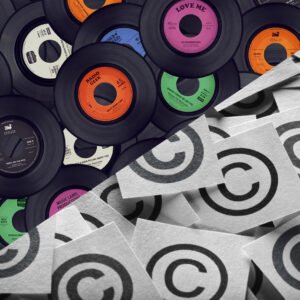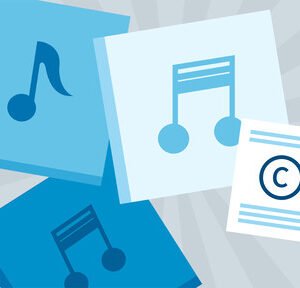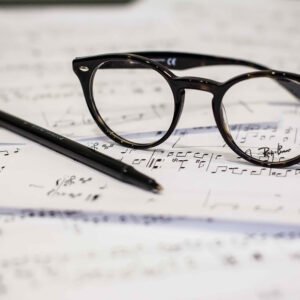Any aspiring musician needs to know the basic Music Copyright laws. Here's what you need to know to protect yourself.
Music is a universal language that transcends boundaries and cultures. Musicians invest countless hours and immense creativity in crafting their musical compositions. Protecting these creative works is of paramount importance, and understanding the basics of music copyright laws is crucial for musicians operating in Nigeria.
In this article, we'll explore essential copyright laws that Nigerian musicians should be aware of to safeguard their intellectual property.
1. Understanding Copyright
Copyright is a legal framework that grants exclusive rights to the creators of original works, including music compositions and lyrics.
In Nigeria, copyright protection is automatic upon the creation of a musical work. This means that as soon as you put your lyrics and melodies on paper or record them, you hold the copyright to your creation.
2. Exclusive Rights
As the copyright holder of your music, you have several exclusive rights, including:
- Reproduction: You have the right to make copies of your music, whether in sheet music form or sound recordings.
- Distribution: You can control how your music is distributed, such as through physical copies, streaming platforms, or downloads.
- Public Performance: You can determine when and where your music is performed publicly, including concerts, radio, and television broadcasts.
- Adaptation: You can decide if your music is used in derivative works like remixes or adaptations.
These rights are essential because they allow you to profit from your creative efforts and have control over how your music is used.
3. Copyright Duration
In Nigeria, copyright protection lasts for the lifetime of the author plus 70 years. This means that your music's copyright protection extends long after your lifetime, benefiting your heirs.
4. Registering Your Copyright
While copyright is automatic upon creation, registering your copyright with the Nigerian Copyright Commission (NCC) is advisable.
Registration provides additional legal protection and makes it easier to prove ownership in case of disputes. It also allows for statutory damages and attorney's fees in case of copyright infringement.
5. Music Sampling and Covers
If you intend to use samples from other copyrighted works or create cover versions of existing songs, you must obtain the necessary licenses and permissions.
Failure to do so can lead to copyright infringement claims.
6. Music Publishing
Music publishing is an integral part of the music industry. When your music is played on the radio or TV, used in films, or performed in public venues, you can earn royalties.
Registering your music with a collective rights organization can help you collect these royalties.
7. Collaboration Agreements
If you collaborate with other musicians, songwriters, or producers, it's crucial to have clear and legally binding agreements that outline the rights and responsibilities of each party.
This ensures that everyone receives their fair share of royalties and credit.
8. Protecting Your Demos
Even your demo recordings are protected by copyright. It's a common misconception that only finalized, polished works are protected.
All your creative efforts, from rough drafts to final recordings, are automatically copyrighted.
9. Fair Use
Understanding the concept of "fair use" is vital. Fair use allows others to use copyrighted material for purposes like commentary, criticism, or education without permission.
However, the lines can be blurry, and disputes may arise. Being aware of the limitations of fair use is essential.
10. International Protection
Nigerian musicians often have a global audience. It's essential to recognize that copyright protection extends internationally through various international treaties and agreements.
This can help you protect your music worldwide.
11. The Nigerian Copyright Act
Musicians in Nigeria are protected by the Nigerian Copyright Act 2022, which provides a legal framework for copyright protection.
This act encompasses various forms of creative works, including musical compositions, lyrics, and sound recordings. Understanding the act is vital for safeguarding your musical creations.
12. Infringement and Legal Recourse
As a musician, you must be prepared to take legal action in case of copyright infringement.
If someone uses your music without permission, you can sue for damages and seek an injunction to stop the infringing activities. Legal assistance is often necessary in such cases.
13. Contracts and Licensing
Musicians frequently enter into contracts and licensing agreements with record labels, music publishers, or other entities.
It's essential to understand the terms of these contracts and how they affect your rights and royalties.
14. Sound Recording vs Composition
Generally, sound recordings are copyrighted separately from the copyright of a musical composition as they are not considered the same work under copyright law.
Musical work copyrights, which are the songs (referred to as “musical work[s]” in the Copyright Act) composed of lyrics, instrumentation, melodies, etc.; and Sound recording copyrights are the master recordings that embody the musical works (a performer also has a copyright in their performance on the sound recording).
Although these two copyrights are inextricably linked for obvious reasons, they are separate business assets that trigger different revenue streams.
Conclusion:
For musicians, a solid grasp of basic music copyright laws is indispensable. Protecting your creative works not only secures your livelihood but also contributes to the growth and development of the Nigerian music industry.
Registering your copyright, knowing your rights, and being aware of legal considerations can ensure that you and your music receive the recognition and compensation you deserve in Nigeria and beyond.
Stay informed, protect your music, and continue to share your talent with the world.
Need Assistance with Music Copyright Registration? We Can Help.
While it's possible to copyright music on your own, it can be a complicated process when it's challenging to understand copyright laws. Let 1710Media help you sort through the red tape and handle all your music copyright needs.
Register and protect music from theft and plagiarism
1710Media provides the fastest and most affordable way for you to protect your copyrights.
Our Music Copyright Service includes the preparation, review, e-filing with the Nigerian Copyright Commission (NCC), and handling of correspondence until you receive your certificates of registration.
-
- We'll file your application with the Nigerian Copyright Commission (NCC).
- Our service includes the preparation, review, e-filing, and delivery of your certificate of registration.
- Receive an Official Copyright Certificate. Valid for your lifetime plus a minimum of 50 years after.
- Register your songs, albums, compositions, beats, lyrics, music videos, artworks, and other musical projects.
- Enjoy protection in Nigeria and 178+ other territories.
Get Started Now!





